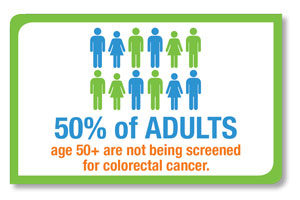What is CT Colonography (CTC)?

- Colorectal cancer (CRC) is cancer that occurs in the colon or rectum. Sometimes it is called colon cancer.
- CRC is currently the second leading cause of cancer death in the United States.1
- Because it is a relatively slow growing cancer, early detection is key.
- When caught early there is a 90% survival rate.2 This is why screening is so important.
CTC or CT Colonography is a screening test for colorectal cancer. The U.S. Preventive Services Task Force (USPSTF) recommends that men and women aged 50–75 be screened for colorectal cancer. The American Cancer Society also makes this recommendation.3
The decision to be screened after the age of 75 should be made on an individual basis. If you are aged 76-85, ask your doctor if you should be screened.
Several different screening tests can be used to find polyps or colorectal cancer. There is strong scientific evidence that screening for colorectal cancer beginning at the age of 50 saves lives.
CTC stands for Computed Tomography (CT) Colonography. It is sometimes called “Virtual Colonoscopy”. CTC is used to screen for colorectal cancer. This patient-friendly test uses special x-ray equipment and computers (“computed tomography”) to produce images of the entire colon (“colonography”). The images are displayed on a computer screen for the radiologist to evaluate.
The CTC Difference:
There are certain advantages that make CTC an attractive option for your colorectal cancer screening:
- It is a non-invasive imaging test
- It takes about 20 minutes to complete
- It requires no sedation

The individuals who appear are for illustrative purposes only. All persons depicted are models and not real patients.
Because you don’t need anesthesia and there is no recovery time, you can even drive yourself home and resume your daily activities after the test. CTC is clinically proven to be effective,4 and it is also a patient-friendly option; surveys show that patients have a high rate of satisfaction with CTC. This is important because the easier the test is, the more likely people will get tested. According to the USPSTF, the best screening test is “the one that gets done”.
For more information and to see a video of the procedure – go to www.radiologyinfo.org
1American Cancer Society. Key statistics for colorectal cancer. Available here. Last revised January 20, 2016. Accessed January 10, 2017.
2Howlader N, Noone AM, Krapcho M, et al, eds. SEER Cancer Statistics Review (CSR), 1975-2013. Bethesda, MD: National Cancer Institute. , based on November 2015 SEER data submission, posted to the SEER web site, April 2016. Accessed April 11, 2017.
3ACS, CRC screening, recommendations, 2016
4Pickhardt, 2010, Eur Rad; Zueco, 2012; Iafrate, 2011
